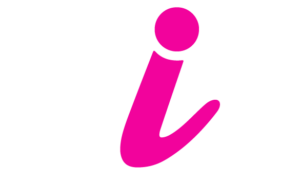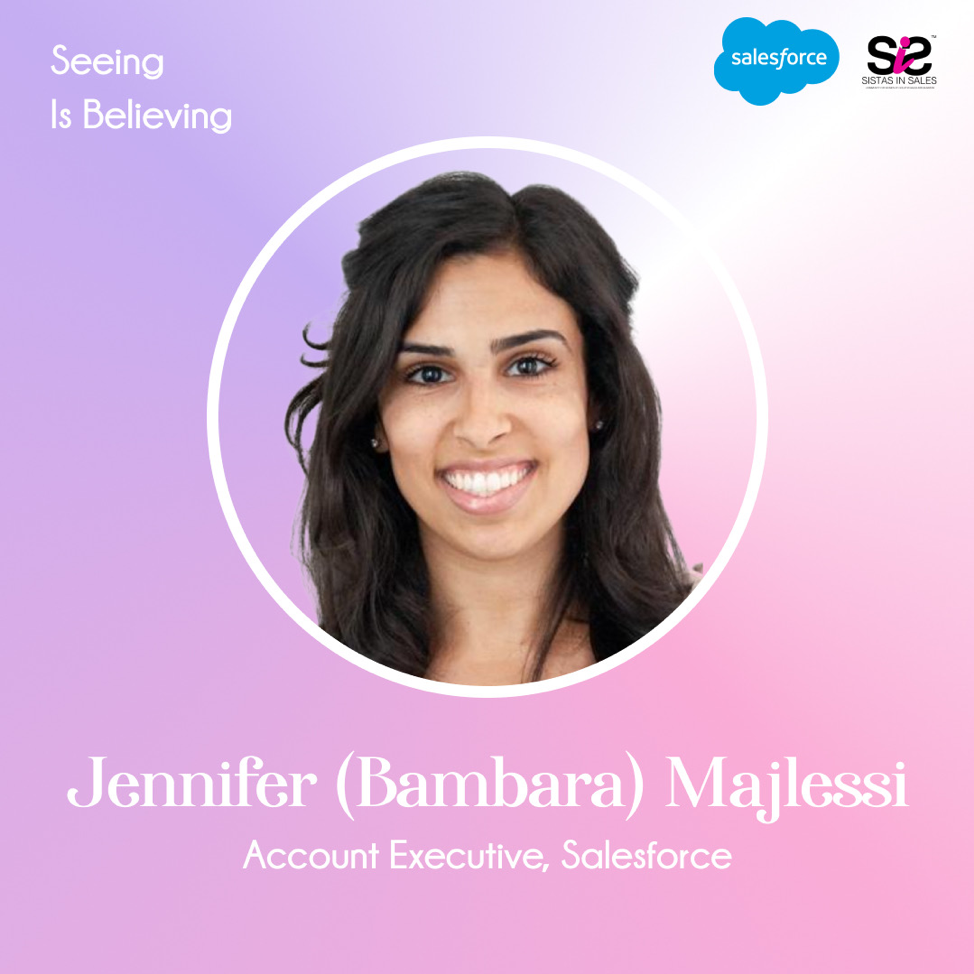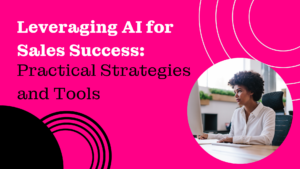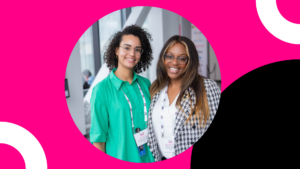Jennifer (Bambara) Majlessi is an Account Executive at Salesforce. She shares: her journey, how she’s pursuing what she loves most, the pros and cons of startups, and how she’s learned ruthless prioritization. Jennifer feels strongly that sales is going through a bit of a renaissance period and that relationships matter more than ever before. Read on for Jennifer’s advice on success in sales.
Jennifer initially had a love for finance and we explored why she decided to transition to sales.
I’m a MidCommercial Account Executive, with a specialization in High Tech at Salesforce. I’ve been in this role since March 2020, almost two years now. I studied finance at Lehigh University and graduated post-recession during a turbulent time. I vividly remember entering my core curriculum at the start of my junior year, during the onset of the recession, and my professors said, “If you don’t absolutely love finance, now is the time to switch majors.” I loved numbers and my mom was a trader on Wall Street, so she was big into math as well. But I’m very personable, so sitting in front of Excel spreadsheets, not talking to anyone all day, didn’t feel quite like it fit. I needed a balance of both worlds and sure enough numbers + social = sales.
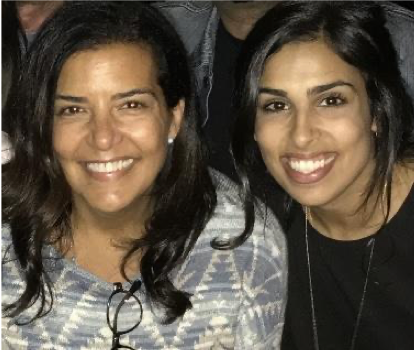
Upon graduation, I took on a sales role at a leading global provider of mission-critical data and insights to help companies accelerate revenue and manage risk. This was an impactful role during a recession as companies looked to protect themselves in order to survive. I began as an intern, cutting my teeth on cold calling, obtaining guidance from great leadership, and absorbing everything I could from successful account executives around me. I knew I had proven myself when I got the opportunity to take on a million-dollar book of business while a coworker was out on temporary leave. This allowed me to flex both my social and math skills which I loved. At this point, I was either headed into investment banking or into sales, and it was then that I realized the relationship building side of sales offered me more fulfillment. From there, I took on a role with the new customer acquisition team and set out to establish, manage, and grow my own relationships and book of business.
You made a leap to a startup; how did that happen and what did you learn from that experience?
Once you get the bug for building, it’s only natural that you consider the startup world. I wanted to know more about what was happening around me and about my customers. I wanted insight into the full customer journey, from how they are marketed to, to their influence on and use of our products. That was when I decided to join a startup specializing in point-of-sale systems that is now powered by Lightspeed. There were about 90 people at that point: few were women, fewer were in sales, and even fewer were women from underrepresented groups. The culture was welcoming and promoted friendly competition. The sale itself was very fast-paced and transactional, and our SaaS platform was powering SMBs to take back main street. We were helping them get back to what they loved about running their business, while providing better insights and faster sales captures. It was awesome to be a part of the digital transformation, migrating entrepreneurs from cash registers to iPads and completely changing the way they ran their business.
After being promoted into a senior individual contributor (IC) role, I had my sights set on leadership. I still enjoyed interacting with our customers and wanted to remain close, so I took on a hybrid role (player/coach) which allowed me to lead from within, managing and selling throughout. This allowed me to gain credibility as a leader, being in the thick of it with them. It also allowed me to liaise between sales and product/marketing to inform our product roadmap, GTM strategy and shared valued perspective of our customers.
Salesforce is quite the departure from the startup world, what was it that attracted you to Salesforce?
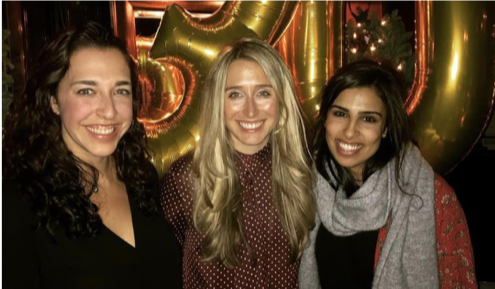
Throughout all my sales roles, the one constant was Sales Cloud and working on the Salesforce platform. Best in class indeed, and it powered all of my sales efforts as an IC and a leader. In every business review, I was asked about my growth goals and they always included learning more about the power of Salesforce. I wanted to build my own reports and truly geeked out on the product. I thought, “I’ve always been passionate about this product. Why don’t I make it my job to learn more about it and share its value with others?” So, I transitioned back into the corporate world as an IC to learn the product and refine my skills, planning to keep leadership top of mind. Salesforce also felt like the right culture. They care about the community and their employees. Our work here is a true team effort. There is no room for a lone wolf because we win and lose as a team, together. I want to contribute and see my contributions, but I also want our collective success. In terms of learning, I wanted to hone my skills as a sales professional and knew I would be learning from, and among, the best. Thinking ahead about my future and career, I saw endless opportunities and a path to growth. Honestly, the pace of this organization feels like a startup, but carries the reputation and resources of an established brand. That’s something I didn’t want to lose, I love agility. We joke about the ever-changing product names and speed with which new products launch, but it is truly impressive. That’s the kind of energy and speed I loved in a startup – that energy with the expertise, resources and collaboration that come with defining a solution as a team, felt like the best way to support our end users. And Salesforce encourages you to bring your whole self to work, adding personalization and creativity to our recommendations so it truly resonates with our customers. The best of both worlds!
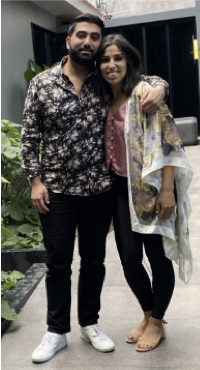
Last year was unique. I knew that onboarding remotely meant that it might take longer for me to ramp up. It helped me build confidence and credibility with myself because I didn’t have the luxury of looking left or right for the answer, but when I needed help, my team was always there to support me. Strangers one day and my Salesforce family the next. I didn’t expect it, I thought it would take time, and understandably so, but we showed up for each other, always. Don’t get me wrong, competition existed in full force – I mean, Salesforce invented “the leaderboard”- but it inspired and created room for everyone’s success. We share decks, resources, success stories, and more. The collaboration and support is real, especially from leadership, who become valued mentors and friends. One leader in particular that inspired the start of my Salesforce journey happens to also come from an Italian/Persian family, and it’s so empowering to see someone just like me leading the charge within the organization. She’s been an integral part of my success – consistently motivating me, celebrating my successes big and small, and showing up to reflect on the learnings within the losses to help me grow. Her leader was also a woman that led from the top, creating a supportive team culture that connected us in ways I couldn’t have imagined would be possible in our new virtual environment.
What would you tell a young woman thinking about their career path or about getting into sales? What does it take to be a successful salesperson at Salesforce?
Sales is having a kind of Renaissance. In my opinion, the ‘car salesperson’ reputation of sales is no longer valid. It’s about building relationships, showing up for people, solving problems, and working as a team. My advice to others would be, think about what you enjoy doing. I knew I enjoyed math and building relationships. It was less about making a ton of money closing big deals but more, “What do I like doing day in and day out?” I learned that I enjoy talking to people, sharing experiences, learning about what’s important to them, and what’s challenging. Think about how you like to spend your time, and do that!
The best career advice I ever received is to always ask for feedback. Win or lose, ask for feedback. In fact, especially when you win, so you can understand what stood out and how to repeat your success. When I get a ‘no’ or a deal falls through, I’m always asking, “What could I have done differently to have earned your business?” Otherwise, how will you know? I have found success in my career by asking for help, checking in with myself in the midst of my success, and then saying, “Is this where I want to be? Is my brand reflective of who I want to be? In my next role, who do I want to be and how do I get there? How do I want people to see me?” I reflect on my evolution and learn from that feedback. Sales is challenging – it’s ever changing and the pressure is high. But, if I look back over the time I’ve spent at Salesforce, and even the last 10 years of my career, I can see my tangible growth. That’s just as exciting for me as seeing myself at the top of the leaderboard.
The skills that make you successful in sales are time management, organization, and ruthless prioritization. You need to have a plan, but also remain agile and be ready for that plan to change.
I learned so much from each job and I think there’s something to be said about the frequency of change. If you’re learning and you’re being challenged, great. If you think you have reached a plateau in your learning, move on and continue pushing yourself.
What is the message you want women to know and what final thoughts can you offer to women in sales?
I recently watched the Jane Fonda documentary, and it was so invigorating because it’s about these obviously powerful women who went against the grain and did the unpopular thing to be an agent for change. Their passion was palpable. My final piece of advice would be: “Don’t ever feel like you can’t do it. Believe in yourself and go for it.”
If you are interested in working with the Salesforce team, apply here.
Are you an entrepreneur? Learn more about what it takes to become a successful saleswoman at Salesforce here.

Jennifer has a Korean rescue named PooCoo. When she’s not selling, she loves taking long dog walks with PooCoo, exploring natural wines and trendy restaurants (via trusted sources: Eater or The Infatuation) with her husband, Jason, and playing soccer or exercising her creative brain with embroidery or jewelry-making.
– SIS Editorial Team
